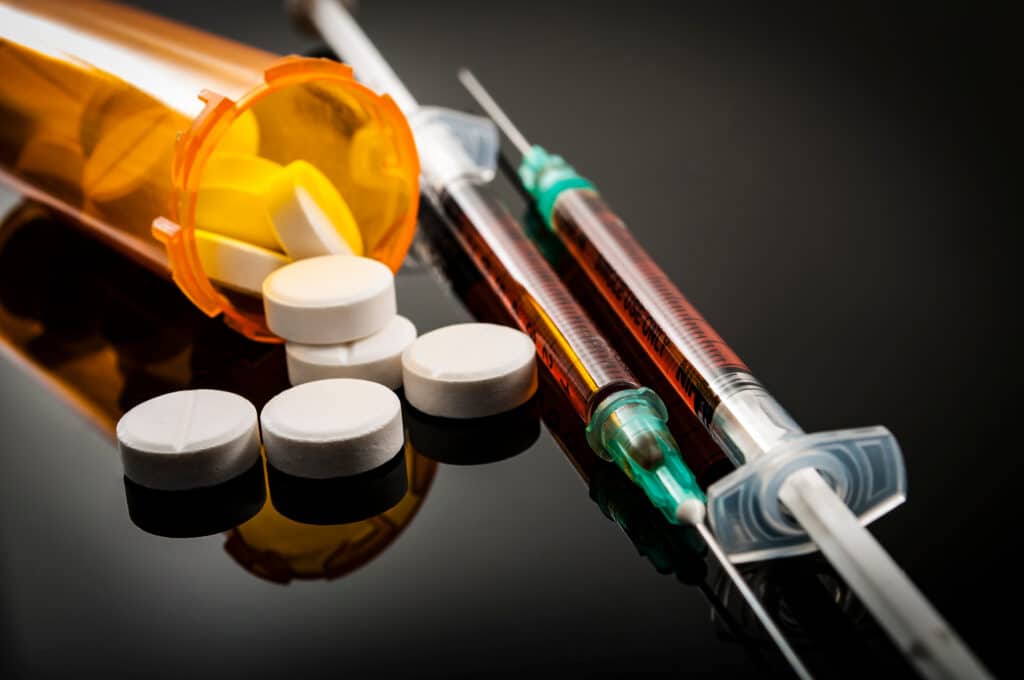The ongoing opioid epidemic has been with us for the last decade, at least. According to the Centers for Disease Control, Colorado experienced more than 31 deaths by overdose for every 100,000 of its population in 2021, putting it right in the middle ranks of states’ overdose death rate. Nationwide, the numbers appear even more grim, with drug overdose deaths involving opioids increasing from just over 70,000 in 2020 to 80,816 in 2021. If you’ve ever wondered, “Where can I find opioid addiction treatment near me?” Northpoint Colorado has the answer.
What Are Opioids?
Opioids are central nervous system depressants, meaning they create euphoric and calming effects for people experiencing physical pain. Opioids act by causing the brain to release dopamine, a pleasure neurotransmitter.
Many opioids have legitimate medical uses. Prescription opioids, for instance, can treat moderate to severe pain like the kind of pain one experiences after surgery, or while living with a health condition like cancer. Some of the most abused prescription opioids include:
- Oxycodone
- Oxycontin
- Percocet
- Vicodin
- Suboxone and Subutex
- Morphine
There are also those opioids that do not come with a prescription: heroin, opium, morphine, and fentanyl.
Opioid use instills feelings of extreme relaxation or euphoria in the user. People who abuse both prescription opioids and illicit opioids use to experience these effects. However, where abuse occurs, addiction is soon to follow. And every day spent addicted to opioids is another day that runs the risk of death. One reason why opioids are so dangerous is that they affect the parts of the brain that control breathing, heart rate, and other automatic bodily functions. It may lead one to ask, “Where can I find opioid addiction treatment near me?”
Signs and Symptoms of Opioid Addiction
As with most other addictive substances, people often try to hide their substance abuse. But for those who pay close attention, there exist certain tell-tale signs, both physical and mental, that could be pointing to an addiction. The most common signs and symptoms of opioid addiction include:
- Wild mood swings
- Sleeping at odd hours
- Significant weight loss
- Ignoring appearance, particularly personal hygiene
- Pulling away from close friends and loved ones
- Engaging in risky behaviors to obtain more opioids
A person with an opioid addiction also tends to get very creative when it comes to obtaining opioids. The following actions are sometimes taken by a person with an ongoing opioid addiction:
- Lying to doctors to obtain a new prescription for opioids
- Seeking the same prescription from multiple doctors (aka “doctor shopping”)
- Trying to borrow or steal painkillers prescribed to someone else
- Using opioids with alcohol or other drugs to refine the “high”
- Taking opioids in a way not intended by the prescribing doctor, including taking more than the prescribed dose
Symptoms of Opioid Withdrawal
With repeated use, an opioid user’s brain chemistry reorders itself to be reliant on opioids for its ability to release dopamine. This is how addiction develops. When an abuser of opioids stops using, in many cases, the brain and body begin to experience withdrawal symptoms.
Withdrawal symptoms can be intense, leading the user to continue using or, in the best-case scenario, start to wonder, “Where can I find opioid treatment near me?” Some of the more common signs of opioid withdrawal include:
- Intense cravings for opioids
- Tremors
- Increased heart rate
- Agitation
- Anxiety
- Cramps
- Muscle pain
- Nausea and vomiting
- Fever
How Opioid Addiction is Treated
Detox is almost always the first step in opioid addiction treatment. Following detox, a client’s treatment team often recommends the most appropriate treatment to follow. It is in the new phase that clients can begin to learn coping skills and make certain behavioral changes to prepare them for long-term sobriety.
Certain factors can influence the length of a detox program. Factors like the type of program, the kind of opioid the patient had been using, how long the patient had been using, the severity of withdrawal symptoms involved, and whether the patient is taking medication to manage their withdrawal symptoms, all come into play.
Opioid addiction treatment in Idaho can occur in several ways. The most effective way depends on the individual. At Northpoint Colorado, our clients have options when it comes to recovery. Our opioid addiction programs include:
Inpatient Treatment
Also known as residential rehab, Inpatient Treatment is one of the most effective types of addiction treatment programs. This treatment provides a secure environment, which means patients will not find themselves in situations where they are able to use dangerous substances. At Northpoint Colorado, we developed our residential treatment program to provide those across the state with safe and effective residential care.
Partial Hospitalization Program (PHP)
Our Partial Hospitalization Program (PHP) help those who have undergone detox and show an intense level of addiction. PHP involves clients attending several treatment appointments each week. Individual and group therapy sessions are also provided during this time.
Intensive Outpatient Program (IOP)
Marking a step down from PHP, our Intensive Outpatient Program allows for a more flexible treatment. IOP offers clients the support and care they need while at the same time allowing them to tend to work, school, or family duties. Treatment sessions are multiple times a week—though fewer than with a PHP treatment—and therapy sessions are offered as well.
The Benefits of Medication-Assisted Treatment (MAT) for Opioid Addiction
Medication-assisted treatment (MAT) for opioid addiction is an evidence-based practice that utilizes prescription medications to treat a person’s substance use disorder. These medications are dispensed under close supervision by one of Northpoint’s qualified healthcare professional during detox, which typically lasts between two and five days. MAT for opioid addiction helps clients manage their withdrawal symptoms during detox and rehab.
Find Effective Opioid Addiction Treatment at Northpoint Colorado
Northpoint Colorado in Loveland, Colo., supports and assists people living with opioid addiction, as well as their loved ones. We offer medically supervised detox with individualized treatment plans for substance use disorder and any cooccurring mental health disorders. To find an answer to the question, “Where do I find opioid addiction treatment near me?” or to learn more about opioid addiction, call 888.231.1281 or contact us online. We’ll gladly provide more information or help you create your customized treatment plan.




